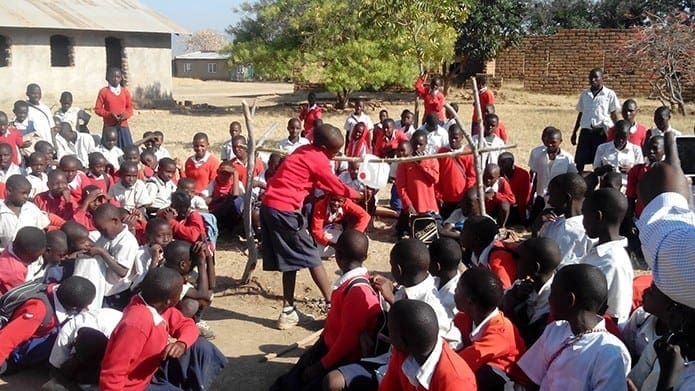 PHOTO BY MARCO VISSER, CRS
PHOTO BY MARCO VISSER, CRSAtlanta
Catholic Relief works in Tanzania on developing small farms, aiding refugees
By NICHOLE GOLDEN, Staff Writer | Published August 6, 2015
ATLANTA—In the east African country of Tanzania, Catholic Relief Services’ programs range from teaching schoolchildren about sanitation and hygiene to supporting agricultural livelihoods and assisting refugees from other nations.
“Our CRS projects are scattered all over the country,” said Cullen Larson, Southeast regional director for the agency. “It’s quite varied.”
Larson worked as interim country representative in Tanzania June 17 to July 20 before a new permanent country representative could arrive.
Larson also served in the same temporary capacity earlier this year in Iraq, where most of CRS’ programs are geared toward helping those who have been displaced in their homeland by war and violence.
“One similarity was the emergency response for displaced people,” he said.
CRS, which is the official international humanitarian effort of the U.S. Catholic community, has had a presence in Tanzania since the 1960s, shortly after its independence from British rule amidst a severe drought.
CRS has 75 employees in Tanzania and works with Caritas Tanzania, the international Catholic aid agency.
“We partner with secular and other organizations,” said Larson. The first choice is always to partner with the local Catholic Church, he added.
On the agricultural front, CRS initiatives include Soybeans Are Money, a USDA-funded project to position the country as a top soybean producer in the region.
Other programs employ a methodology where members of a small community pool their funds to improve their mutual livelihood. Members of the Savings and Internal Lending Communities, typically groups of women, pool their funds to get better seed, fertilizers and invest in one another.
“Our focus is the small famers,” said Larson.
CRS Tanzania is also implementing the Farmer-to-Farmer USAID program where Americans with agricultural expertise come and share knowledge.
CRS oversees programs in Mbeya in southwest Tanzania. It is a mountainous region.
In Mbeya, CRS presents SWASH or the school water and hygiene program. The goal of the program, said Larson, is to support children in their education by first keeping them healthy.
SWASH helps establish a water supply, create sustainable latrines, recycle waste as fertilizer, and set up hand-washing stations.
“We’re focused on improving the environment for the schools,” said Larson.
The Kawatere primary school is one of the target schools. It had no water at the time of Larson’s visit, although a water supply was set to arrive along with new latrines for 455 children.
Many of these children walk long distances to school and carry whatever food or water they might have at home.
“They start out walking in the dark,” said Larson.
The school buildings themselves are open air.
“They’d love to have some windows,” he said.
While in Mbeya, Larson also joined CRS colleagues for a meeting with Bishop Evaristo Chengula of the Diocese of Mbeya. The bishop expressed appreciation for the CRS/Caritas work in the region and outlined priorities of the community, including supporting development of livelihoods for families.
Thousands of Burundi refugees need aid
In Kigoma, the CRS work is focused on providing emergency needs to refugees from Burundi.
In May, CRS and Caritas began helping some of the nearly 90,000 refugees from neighboring Burundi, the majority of them women and children.
Approximately 6,000 refugees were crowding into a soccer stadium at Lake Tanganyika only intended to hold 1,800 people.
The assistance included food distribution, registration, latrines, showers and hygiene promotion.
“Things like cholera and malaria are serious issues,” said Larson.
The stadium was recently cleared, but aid workers expect another influx of refugees from Burundi. “The facts and the numbers change constantly,” said Larson.
The refugees are fleeing violence that erupted after Burundi’s president Pierre Nkurunziza made the controversial decision to run for a third term, a process that Larson said was “generally regarded as lacking any integrity by the international community.”
After arriving at the stadium, refugees were transported to a UNHCR refugee camp, which is also overcrowded.
“It’s quite a journey,” said Larson.
He ventured out by boat with others on Lake Tanganyika, one of the “great lakes of Africa.” Due to mechanical problems, the group had to return to Kigoma, but it gave Larson a sense of what it takes to get to Tanzania. The water is often the only way out for those escaping Burundi.
In Manyovu, near the Burundi border there is a refugee reception center in need of blankets, plastic sheeting and roofing repair materials. Beans cooked over fires are used to feed those stopping at the center, which is a way station of sorts.
“That would be their first stop,” said Larson.
When presenting programs to students or groups in Atlanta, Larson generally asks for prayers for all countries where CRS serves.
“We believe in it,” he said.
Those wishing to learn more about Tanzania and the agency’s work, may visit the CRS website.
If donors feel so led, they can specify or earmark donations to CRS for Tanzania, but general donations are helpful.
“It gives us the flexibility to direct it where the need is greatest at that time,” said Larson. “We are here as the church for all people in need.”
For information, visit www.crs.org/tanzania.